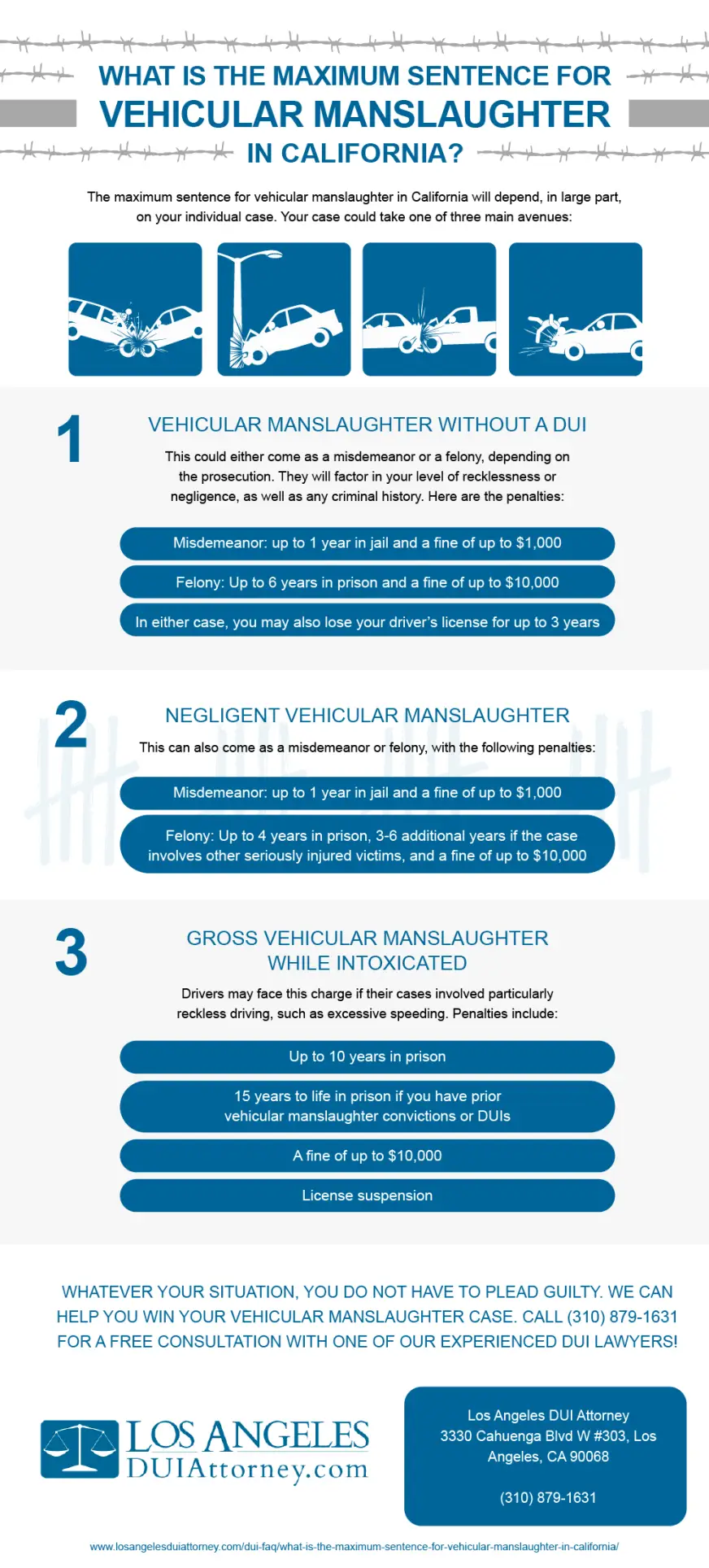
The maximum sentence for vehicular manslaughter depends on which specific offense you were charged with. These can include normal vehicular manslaughter under California PC 192, or DUI vehicular manslaughter under California PC 191.5.
Additionally, there are different versions of each of these offenses, depending on the circumstances. Below, we’ll look at the maximum sentence for each separate offense.

What Counts As Vehicular Manslaughter in California?
In the state of California, vehicular manslaughter is considered a serious offense. Legally, this crime is defined as the act of an impaired driver causing death due to reckless actions while behind the wheel. If the impaired driver was negligent, this still is considered a crime because an individual has died due to these careless actions.
Within each vehicular manslaughter charge, law enforcement agents must decide on negligence or intentional actions. Here are some things to consider:
- Has the driver intentionally used their vehicle to strike another person?
- Was the driver following road rules and driving legally?
- Did the driver know their actions were of danger to others?
The answers to these questions will determine whether or not this crime of manslaughter was negligent or intentional. Additionally, a vehicular manslaughter charge could fall into two types of categories. These categories are:
- Ordinary negligence: If the driver is not only impaired but also driving recklessly above the speed limit, running stop sights, or any other normal driving felony, the charge will be considered ordinary negligence.
- Gross negligence: If the driver conducts themselves even more recklessly than committing simple driving offenses while under the influence of drugs or alcohol, this will be considered gross negligence.
What’s the Biggest Difference Between Misdemeanor Vehicular Manslaughter and Gross Vehicular Manslaughter?
As stated above, there are a few differences between vehicular manslaughter and gross vehicular manslaughter. However, the largest and most important difference between these two crimes is the driver’s mental state.
A vehicular manslaughter charge will involve ordinary negligence, whereas gross vehicle manslaughter requires proof of the driver’s impaired state. Gross negligence is defined as more than ordinary negligence. Meaning, there needs to be evidence against the driver that proves they were acting in a way that could cause harm to others.
Maximum Sentence for Vehicular Manslaughter (no DUI)
This offense can be charged as either a misdemeanor or a felony at the prosecutor’s discretion. They will choose the charge based on how reckless or negligent you were being, your previous criminal history, and how strong their case against you is.
The maximum sentence for each one is:
- Misdemeanor version: Up to one year in county jail and a fine of up to $1,000
- Felony version: Up to six years in state prison and a fine of up to $10,000
You will face additional penalties if:
- Your vehicular manslaughter involved an illicit attempt at a financial gain (such as insurance money), or
- You fled the scene after your vehicular manslaughter
- You may also lose your driver’s license for three years
Maximum Sentence for Negligent Vehicular Manslaughter While Intoxicated (191.5b)
This law is used when a DUI accident becomes vehicular manslaughter. It can also be charged as a misdemeanor or a felony. The maximum sentence for each one is:
- Misdemeanor version: Up to one year in county jail and a fine of up to $1,000
- Felony version: Up to four years in state prison, plus three to six more years if other victims were seriously injured, and a fine of up to $10,000
You can also face a wide variety of DUI penalties, including mandatory alcohol or drug treatment and having your driver’s license revoked.
Maximum Sentence for Gross Vehicular Manslaughter While Intoxicated (191.5a)
If a DUI death involves particularly reckless driving, such as excessive speeding or driving the wrong way on the road, it may be charged as “gross” vehicular manslaughter DUI. This is a far more serious charge. Penalties include:
- Up to 10 years in state prison, or
- 15 years to life in prison if you have any prior vehicular manslaughter convictions, or
- 15 years to life if you have two or more previous DUIs
- You will also face a fine of up to $10,000 and the other penalties listed above, including license suspension.
These charges are very serious, and you need an experienced lawyer on your side when you face them. Do not plead guilty unless you have spoken to a lawyer.
You Can Win Your Vehicular Manslaughter Case
Have you been charged with vehicular manslaughter in California? We can connect you with an experienced Los Angeles DUI lawyer and get you a FREE consultation. Fill out the form to the right or contact us and get your free consultation today.






